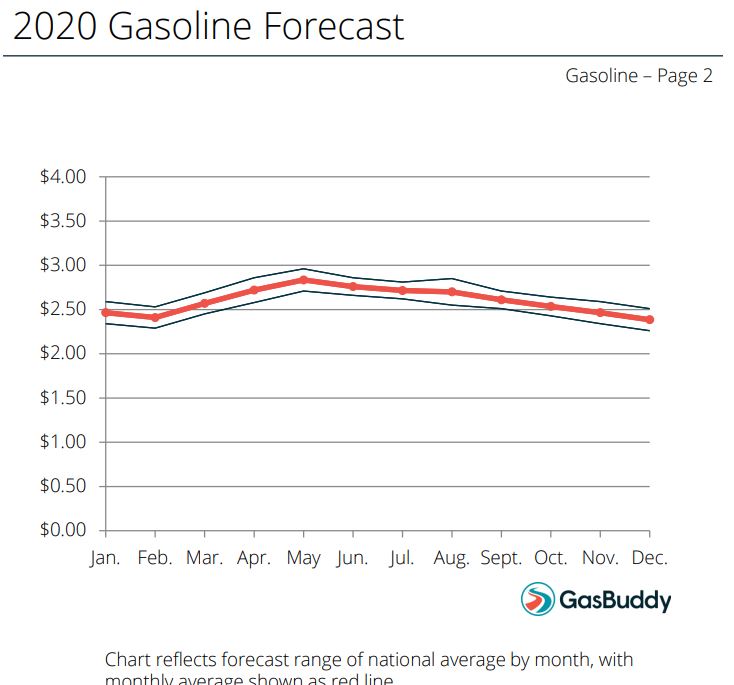U.S. Fuel Prices Remain Stable, But Iran’s Response Could Change Things
One analyst predicts gas could hit $3 a gallon if Iran retaliates in a way that impacts the supply of oil in the region.

Editor’s note: This story has been updated with new and corrected details.
The conflict between the United States and Iran has not had a big impact on fuel prices yet.
Iran launched missiles at two military bases housing American forces in Iraq in retaliation for the U.S. drone strike that killed an Iranian general. There were no immediate reports of casualties in Iraq.
Oil prices rose $3 dollars a barrel after the Iranian missile attack. The average price of regular gasoline in the U.S. rose by less than three cents a gallon.
One petroleum analyst says prices could rise sharply if Iran takes further action.
“This is really a story about potential,” says Patrick DeHaan of GasBuddy.com. “We’re looking for market worries about retaliation, where more of an impact could come down to what motorists are paying.”
DeHaan says retaliation could be similar to the 2019 attacks against Saudi Arabian facilities that cost millions of barrels of oil production.
“If Iran retaliates against oil installations, or infrastructure, there could be a higher chance of hitting $3 per gallon.” – Patrick DeHaan, GasBuddy petroleum analyst.
Demand for fuel is typically low in January and February, and that could blunt the effect of any immediate retaliation that disrupts oil production. Prices are also affected by things such as refineries shutting down for maintenance.
“Generally, the impacts that affect us the most are those between the refinery and the gas station,” DeHaan says.
GasBuddy issued its 2020 fuel price forecast before the deadly drone strike in Iraq. It says the highest daily average prices in Metro Detroit could range between $2.85 and $3.10 per gallon.
Read GasBuddy’s 2020 fuel forecast here.
If Iran does not retaliate against oil production facilities, DeHaan says prices might stay below $3 per gallon.
Click on the player to hear Patrick DeHaan’s conversation with WDET’s Pat Batcheller, and read a transcript, edited for clarity, below.
Pat Batcheller, 101.9 WDET: What are you watching for right now as this situation with Iran develops?
Patrick DeHaan, GasBuddy,com: We continue to watch the price of oil. So far, there hasn’t been any disruption. Crude oil production internationally remains unchanged. This is really a story about potential. We’re looking for potential retaliation from Iran. In the last year, Iran has gone after Saudi Arabia with attacks on oil-producing facilities last September, as well as chasing and commandeering ships in the Strait of Hormuz, which is also a threat. We’re looking for market worries about potential retaliation, and that’s where more of an impact could come down to what motorists are paying.
What kind of impact could retaliation have?
Any retaliation in the form of going after infrastructure could kink the delicate balance of supply and demand. And that’s really what we’re looking at. Of course, the September attack on Saudi Arabia that Iran initiated knocked out millions of barrels per day of oil production. And so it’s an event like that which would really spook and send prices up quickly.

Fuel prices usually decline at the start of a new year because demand is typically weaker in winter. Is that still the case?
It is. And that’s certainly one of the mitigating factors for potential retaliation, is that demand remains relatively low in the coldest months of the year, January and February. So if Iran does choose to retaliate in the next 60 days or so, the effect may be blunted partially by the fact that we are in a low demand time of year for oil and gasoline.
Before the attack that killed Gen. Soleimani, you had issued your 2020 fuel price outlook for Detroit and other U-S cities, which is not a prediction of what will happen, but would could happen. Depending on what happens next with Iran, what can drivers in Metro Detroit expect this year?
Well, I think normally what I’d be looking for would be a year that was very similar to 2019. Prices on average may come very close to $3 once we hit April or May. That’s about the time of year when we normally see a peak in price. They certainly could go over it, contingent on what happens with Iran. If they retaliate against oil installations or infrastructure, there could be a higher chance of hitting $3 a gallon. Without that, I think we may stay just under that level, with a yearly average that’s fairly close to what we saw last year.
What other factors typically affect fuel prices?
Any kinks in supply and demand. That could be locally, regionally, or internationally as well. A lot of what we see every spring is generally at the hands of local refineries who do maintenance before the summer driving season. Some of that maintenance may go longer than expected and has an impact on prices. But generally, the impacts that play out and affect us most are those between the refinery and the gas station, whether it’s the refinery itself, pipeline issues, anything to disrupt the normal flow of oil and gasoline is something we may end up paying for.
How accurate are your forecasts, and do you revise them as needed?
We revise them if needed, but I will point out that our prediction for last year, 2019, was for a yearly average of $2.70 per gallon, and what we actually saw was a yearly average of $2.62. Though an event like this, the situation with Iran, it may be tempting to revise forecasts, it’s certainly very early to know what may happen from here on out. Last year, we had no revisions and our forecast was very close. Of course, we hope the same will hold true this year.

